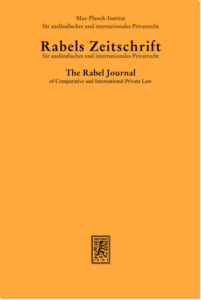New issue alert: RabelsZ 87 (2023), Issue 3
 The latest issue of RabelsZ has just been released. It contans the following articles:
The latest issue of RabelsZ has just been released. It contans the following articles:
Horatia Muir Watt: Alterity in the Conflict of Laws. An Ontology of the In-Between
[18th Ernst Rabel Lecture, 2022] [OPEN ACCESS], 433–464, DOI: 10.1628/rabelsz-2023-0063
The conflict of laws can serve heuristically to underscore two established but radically opposing models of modernist legal ordering: multilateralism and statutism. Such a prism is helpful if we want to rethink (as we must!) our late-modern legality’s deep epistemological settings in the shadow of the »catastrophic times« to come, whether in terms of environmental devastation or political dislocation. Both phenomena are profoundly linked and indeed constitute two faces of alterity, natural and cultural, from which modernity has progressively taught us to distance ourselves. Importantly, law encodes the conditions that produce these dual somatic symptoms in our contemporary societies. This chasm between nature and culture has produced humanity’s »ontological privilege« over our natural surroundings and a similar claim of superiority of modern (Western) worldviews over »the rest«. In this respect, the main achievement of the moderns, as Bruno Latour wryly observed, has been to universalise the collective blindness and amnesia that allow our »anthropocentric machine« to hurtle on, devastating life in its path and devouring the very resources it needs to survive.
Anton S. Zimmermann: Kriegskollisionsrecht. Ein Beitrag zum international-privatrechtlichen Umgang mit Gebietseroberungen (War and the Conflict of Laws – Private International Law’s Treatment of Territorial Conquest), 665–496, DOI: 10.1628/rabelsz-2023-0058
The Russian war of aggression against Ukraine constitutes a breach of a fundamental consensus in public international law: states have authority over their territory. One element of territorial sovereignty is the right to legislate in the field of private law. If a territory is conquered, this right is – in breach of public international law – usurped by the conquering state. This article examines how private international law deals with such changes in factual power. It demonstrates that private international law is more flexible than is commonly assumed and that it can provide a differentiated and adequate reaction to occupations and annexations.
Wenliang Zhang, Guangjian Tu: Recent Efforts in China’s Ambition to Become a Centre for International Commercial Litigation, 497–531, DOI: 10.1628/rabelsz-2023-0064
The last decade or so has witnessed intensifying efforts by China to reshape its legal framework for international commercial litigation. These efforts echo its advancement of the »One Belt and One Road Initiative« and a policy of strengthening the foreign-related rule of law. But the measures so far have been piecemeal and were adopted mainly by the Supreme People’s Court (SPC). Leading lower Chinese courts, the SPC has zealously advanced the reform of international commercial litigation by devices such as international commercial courts (ICCs), anti-suit injunctions, forum non conveniens and de jure reciprocity favouring recognition and enforcement of foreign judgments. Such efforts may help modernize China’s mechanism for international commercial litigation, and more are expected. Although what the SPC has been doing moves closer to the global mainstream and is on the right track, deep reforms are still needed before the Chinese international commercial litigation regime can »go global«.
Mathias Habersack, Peter Zickgraf: Sorgfaltspflichten und Haftung in der Lieferkette als Regelungsmodell: Rechtsentwicklung – Rechtsvergleichung – Rechtsökonomik – Rechtsdogmatik (Corporate Sustainability Due Diligence and Supply Chain Liability as a Regulatory Model: Legal Developments – Comparative Assessment – Economic Analysis – Legal Theory), 532–607, DOI: 10.1628/rabelsz-2023-0060
The proposal for a Corporate Sustainability Due Diligence Directive significantly exceeds the German Supply Chain Act (LkSG) not only in terms of its scope of application and the protected interests, but also regarding the enforcement mechanism in the event of a violation of a due diligence duty. While the LkSG has taken a stand against private enforcement in its § 3 para. 3 s. 1, Art. 22 of the proposed Corporate Sustainability Due Diligence Directive makes companies civilly liable for misconduct committed by their subsidiaries and business partners. The present article deals with the conceptual fundamentals of this regulatory model: From a comparative perspective, the proposed duties and accompanying civil liability mark a departure from the independent contractor rule which is deeply rooted in the tort laws of the German and Anglo-American legal families; the proposed regulatory model thus brings about a sector-specific paradigm shift in the law of non-contractual liability. From a law and economics perspective, however, the proposed regulatory model is justifiable given the special factors present in typical cases. The liability risks associated with the regulatory model appear to be manageable for companies if the pre-conditions of their potential civil liability are more clearly specified.
BOOK REVIEWS
As always, this issue also contains several reviews of literature in the fields of private international law, international civil procedure, transnational law, and comparative law (pp. 608–640).


